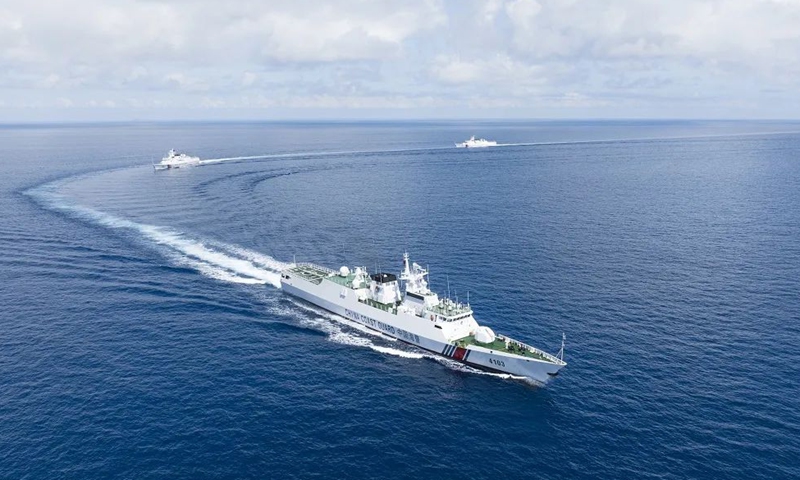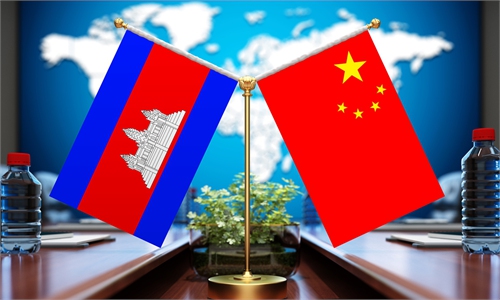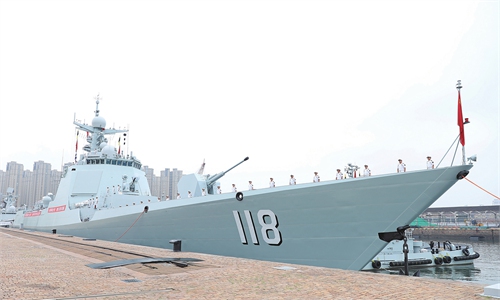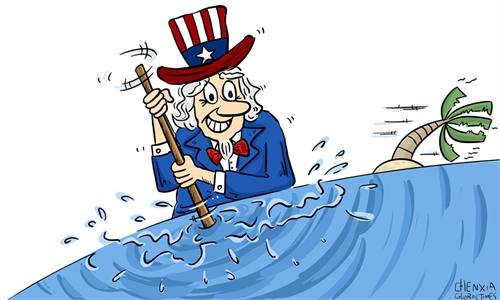China takes restriction measures amid Philippine vessels trespassing
US support fuels audacity of provocations by Philippines: analysts

Vessels of the China Coast Guard conduct law enforcement exercises in an undisclosed area in Autumn 2022. Photo: Screenshot from WeChat account of China Coast Guard
The China Coast Guard (CCG) on Sunday took restriction measures when Philippine vessels again trespassed into waters off a Chinese reef in the South China Sea and intentionally rammed a Chinese ship, with observers slamming the Philippines for breaking a tacit understanding with China and launching unprofessional operations, and also the US for fueling the Philippines' audacity of provocations.
Two coast guard ships, one government ship and one transport ship from the Philippines attempted to send building materials to its illegally grounded warship on the Ren'ai Jiao (also known as Ren'ai Reef) on Sunday, seriously violating China's sovereignty, and the CCG implemented restriction measures in accordance with the law and regulations, the CCG said in a press release on Sunday early in the morning.
Later on Sunday morning, the CCG issued a second press release, revealing that despite stern warnings from China, a Philippine vessel, the Unaiza May 1, violated the International Regulations for Preventing Collisions at Sea and made an unprofessional and dangerous turn at 6:39 am, as it intentionally rammed into CCG ship 21556, which was on a routine law enforcement mission, resulting in a minor collision.
CCG spokesperson Gan Yu said in a statement on Sunday afternoon that the CCG took restriction measures against the Philippine vessel Kalayaan, which carried building materials, while CCG made a temporary special arrangement to the Unaiza May 1 that carried necessary living materials including food.
Chinese on-site operations were legitimate and professional, and the responsibility for the minor collision lies with the Philippine side that intentionally provoked Chinese ships, Gan said, demanding the Philippines to immediately stop its infringements and strictly restrict frontline provocations.
The Philippine vessels' trespasses in waters off Ren'ai Reef on Sunday marked the second consecutive day the Philippines has provoked over a Chinese island or reef in the South China Sea, as three Philippines vessels from its bureau of fisheries and aquatic resources intruded into waters adjacent to China's Huangyan Dao (also known as Huangyan Island) on Saturday and saw their maneuvers restricted by the China Coast Guard in accordance with the law.
Chen Xiangmiao, director of the world navy research center at the National Institute for South China Sea Studies, told the Global Times on Sunday that the main reasons behind the recent consecutive confrontations between China and the Philippines over islands and reefs in the South China Sea are that the Philippines unilaterally broke the tacit understanding that was previously reached by the two countries, and the Philippines' unprofessional operations.
Under representations and protests from China, the Philippines had agreed to tow away its warship that was illegally grounded on Ren'ai Reef in 1999, and when the Philippines previously sent supplies to the warship - with no building materials allowed - it had informed China, Chen said.
However starting this year, the Philippines no longer informs the Chinese side and started to send building materials in an obvious attempt to repair its deteriorating warship and build some permanent facilities like generators, living quarters and even military fortifications, Chen said.
While this round of provocations by the Philippines started in August, a recent US warship trespass in waters off Ren'ai Reef further encouraged the country's audacity, observers said.
The USS Gabrielle Giffords littoral combat ship on December 4 illegally intruded into waters adjacent to Ren'ai Reef without authorization from the Chinese government, and the Chinese People's Liberation Army (PLA) Southern Theater Command organized naval forces, and tracked and monitored the US vessel throughout its entire course on high alert, Senior Colonel Tian Junli, a spokesperson at the PLA Southern Theater Command, said in a statement on the day.
Chen said that the US has been encouraging the Philippines' provocations, including sending spy planes and holding training activities near the region, which is another reason behind the recent tensions.
According to reports by Reuters, the CCG fired water cannons as part of its restriction measures during the incidents on Saturday and Sunday.
While the Philippines and the Western media want to hype the so-called aggressive actions by China, the reported deployment of water cannons reflects China's restraint in dealing with the Philippine provocations in a move to avoid a potential escalation, analysts said.
Water cannons are a defensive tool and is not for offensive use, as it is deployed to warn and stop provocations, a Chinese military expert who requested anonymity told the Global Times on Sunday.
China has decisive advantages over the Philippines when comparing the two countries' maritime forces, so should a conflict really take place in an uncontrolled manner, it is the Philippines that will suffer, the expert said.
China's restriction measures are aimed at safeguarding its national sovereignty, and are completely legitimate and justified, said experts, who urged the Philippines to stop making provocations, return to talks to resolve differences, and tow away its illegally grounded warship on the Ren'ai Reef as soon as possible as it had once promised.




